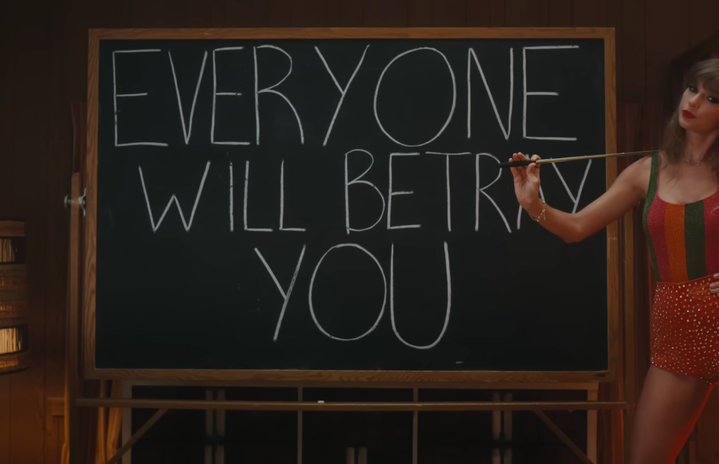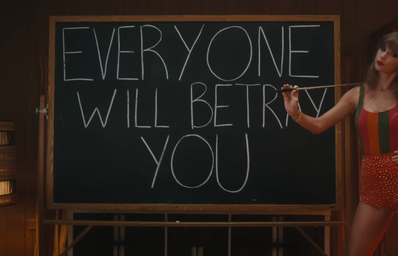What this Means for those in Eating Disorder Recovery
TW: discussion of eating disorders
On Taylor Swift’s recent album, “Midnights,” the song “Anti-Hero” gives us the most vulnerable and raw depictions of her insecurities and what it is like to be in Swift’s head. While we have already seen a very vulnerable side of Taylor through songs like “Soon You’ll Get Better” and “Mirrorball”, “Anti-Hero” is one of the first times she has outwardly sung about her constant battle with body image and her relationship with food.
Taylor Swift opened up about her eating disorder in her documentary “Miss Americana” where she described her relationship with food as “unhealthy” and touched on how damaging it was for her to constantly see pictures of herself online. Swift states that in the past seeing “a picture of me where I feel like I looked like my tummy was too big, or… someone said that I looked pregnant … and that’ll just trigger me to just starve a little bit — just stop eating.”
In the documentary, Taylor says, “I thought that I was supposed to feel like I was going to pass out at the end of a show, or in the middle of it,” and that when people began to worry about her health while noticing these patterns she would lie and say “of course, I eat. I exercise a lot… but I wasn’t eating.” In “Miss Americana,” Swift expanded on the idea that her whole belief system was built upon “being thought of as good” and this disordered pattern only reinforced the psychology her mind revolved around.
In the documentary, we saw Taylor come full circle as she explained that she began to appreciate her body and heal her relationship with food, she states that “If you’re thin enough, then you don’t have that ass that everybody wants, but if you have enough weight on you to have an ass, your stomach isn’t flat enough. It’s all just f—ing impossible.”
Seeing Swift open up about her struggles and insecurities has made her more relatable as an artist – for the first time, we are able to see her as more than just a famous singer, but rather someone who goes through the same things as her fans. By opening up in this way, Taylor Swift – as a leading figure in the media – has become responsible for being accountable to all her fans. Regardless of the fans’ body experiences, Swift holds a space for fans to be able to connect with her experience.
Before the change to the “Anti-Hero” music video, one of the scenes showed Swift looking down at a scale and seeing the word “fat” rather than a number. She used this video as a space to bring her insecurities to life and show fans her experience with disordered eating.
But soon after the music video was released, the scene in the music video was taken out when people began to claim that they found the video offensive. An article by rolling stone says that “some people found the imagery problematic and called the scene fatphobic because it ‘reinforced the idea of being ‘fat’ as bad.” Online comments flooded about the scene, each further critiquing Swift’s personal experience – which was the whole point of the music video in the first place – and challenging the purpose of it being included in the video.
Many viewers have expressed that the scene in the video depicts a fatphobic view on Swift’s part. In the article “Taylor Swift, Fatphobia, and Me,” Olivia Truffaut-Wong writes that “the idea of being ‘fat’ might be an ‘intrusive thought’ or a ‘nightmare’ for Swift.” Along with this, many have expressed that the scene in the video has left them with the messages that they are “monsters” in a world where Taylor being a traditionally thin white woman brings her immense privilege.
I am no stranger to how Taylor depicts her feelings in the music video. When I first watched the music video tears flooded my eyes during this scene – she was painting a picture of what my mind has always believed about myself. I think that having to remove the scene to replace it with one that will appeal to these comments has completely removed the validity from her experience and fans’ experiences about the point she is trying to get across. But still, I hold the same privilege as Swift by being a traditionally thin white woman.
The National Organization for Women states that at “age thirteen, 53% of American girls are ‘unhappy with their bodies.’ This grows to 78% by the time girls reach seventeen.” Furthermore, 13% of adolescents will develop an eating disorder by the age of 20. Many individuals with an eating disorder will also experience a distorted body image – and many will still feel “fat” no matter how thin they are.
Much of Swift’s audience will fit this description. Swift alludes to this distorted body mindset through the controversial scene in the “Anti-Hero” music video. Public comments that express the fatphobic nature of this, to the point where the scene was removed, sends a message to people watching that their feelings are not validated and makes it known that they should not think this way – even if it is the only thing that their brain knows.
I think Swift holds a huge responsibility to ensure that fans are accounted for through her depictions in such a massive video release. By sharing her experiences, Swift attempts to set a very inclusive and relatable tone, but many have described it as “a shitty way to describe her body image struggles.” It is easy to assume that many will be able to relate to her experience, and while many do, the “Anti-Hero” music video fails to consider the experiences of overweight individuals today. As someone who holds so much influence over millions and carries a very privileged position, using the word “fat” and then removing the scene without publicly addressing the concerns puts her validity into questioning.The conversation of censoring the “Anti-Hero” music video is crucial for the media and today’s conversations regarding body image. An article by NBC writes that “by showing the scale with ‘FAT’ on it, Swift was boldly demonstrating the damage the rhetoric of valuing thinness and demonizing larger bodies has done to her.” Still, through this, it is extremely important to consider the two sides that viewers hold when looking at the “fat” scene in the video. Millions of fans watching have felt extremely validated by watching Taylor’s experience with her eating disorder to only have it stripped away from them days later, but many are also questioning Taylor’s position through the thin privilege she holds by being afraid to live in a “fat” body and furthering the stigma of being “fat.” Everyone will have a different opinion on the video, which is an inherent aspect of all art.


